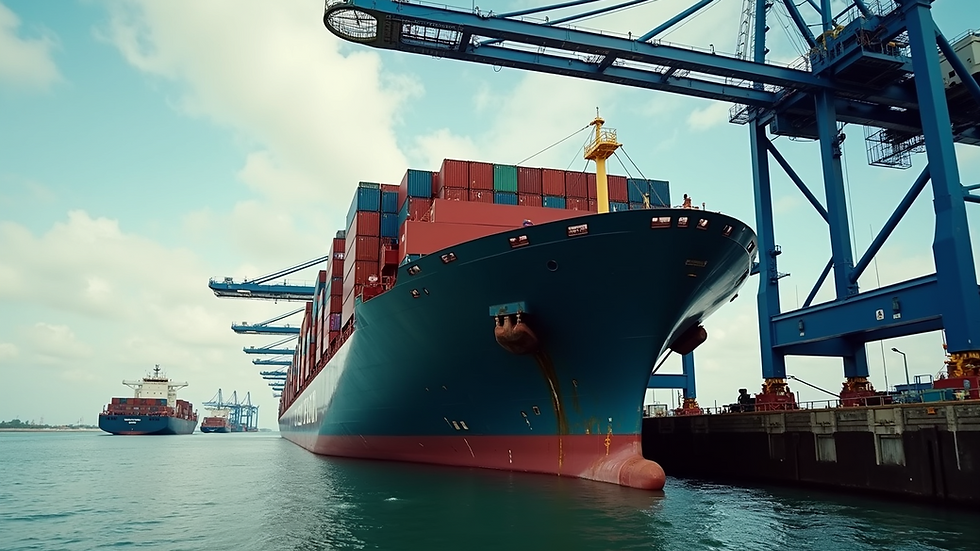Maximizing B2B Contracts in Logistics Industry
- Org Ns
- Nov 2, 2025
- 4 min read
In the logistics industry, securing and maximizing B2B contracts can make the difference between steady growth and stagnation. Companies face intense competition, tight margins, and complex supply chains. Winning contracts is only the first step; the real challenge lies in managing and expanding these agreements to boost profitability and build long-term partnerships. This post explores practical strategies to help logistics providers get the most from their B2B contracts.

Understand Client Needs Deeply
A contract is more than a signed document. It reflects a business relationship that thrives when both parties understand each other’s goals and challenges. Logistics providers should invest time in learning about their clients’ operations, pain points, and growth plans.
Conduct thorough needs assessments before drafting proposals.
Ask questions about delivery timelines, volume fluctuations, and special handling requirements.
Identify opportunities where your services can reduce costs or improve efficiency for the client.
For example, a logistics company working with a retail chain might discover that seasonal spikes cause bottlenecks. Offering flexible staffing or additional transport capacity during peak times can add value and justify contract expansions.
Build Clear and Flexible Contracts
Contracts in logistics must balance clarity with flexibility. Ambiguous terms can lead to disputes, while overly rigid agreements may prevent adapting to changing circumstances.
Define service levels, delivery schedules, and penalties clearly.
Include clauses for volume adjustments or route changes.
Set review periods to revisit terms based on performance and market conditions.
A contract that allows for quarterly reviews can help both parties adjust pricing or services as fuel costs or demand patterns shift. This approach builds trust and reduces the risk of contract termination.
Use Technology to Enhance Service Delivery
Technology plays a crucial role in fulfilling logistics contracts efficiently. Real-time tracking, automated inventory management, and data analytics improve transparency and responsiveness.
Implement transportation management systems (TMS) to optimize routes and reduce costs.
Use warehouse management software to improve order accuracy and speed.
Share tracking data with clients to keep them informed and reduce inquiries.
For instance, a logistics provider using GPS tracking can alert clients immediately if a shipment is delayed, allowing them to adjust their plans proactively. This level of communication strengthens the partnership and supports contract renewal.
Focus on Performance Metrics
Measuring and reporting on key performance indicators (KPIs) helps demonstrate value to clients and identify areas for improvement.
Track on-time delivery rates, damage incidents, and order accuracy.
Share monthly or quarterly performance reports with clients.
Use data to propose service improvements or cost-saving measures.
A logistics company that consistently meets or exceeds KPIs builds a reputation for reliability. This track record encourages clients to increase contract volumes or extend contract durations.
Foster Strong Client Relationships
Beyond the contract terms, personal relationships matter. Regular communication and responsiveness create goodwill and open doors for new opportunities.
Assign dedicated account managers to key clients.
Schedule regular check-ins to discuss performance and upcoming needs.
Respond quickly to client concerns or requests.
For example, a logistics provider that proactively suggests solutions during a client’s supply chain disruption shows commitment beyond the contract. This attitude can lead to referrals and additional contracts.
Negotiate Win-Win Pricing Models
Pricing is often the most sensitive part of B2B contracts. Finding a balance between profitability and competitiveness requires creativity.
Consider volume discounts or tiered pricing to reward larger orders.
Use cost-plus pricing for complex or customized services.
Include incentives for early payments or long-term commitments.
A flexible pricing model that aligns with client growth encourages them to increase order volumes. For example, offering a discount after a certain shipment threshold motivates clients to consolidate orders.
Manage Risks Proactively
Logistics contracts involve risks such as delays, damages, or regulatory changes. Identifying and managing these risks protects both parties and ensures smoother operations.
Include clear liability and insurance clauses.
Develop contingency plans for common disruptions like weather or strikes.
Stay updated on regulatory requirements affecting transport and storage.
By addressing risks upfront, logistics providers reduce surprises and build client confidence. This approach supports contract stability and renewal.
Leverage Case Studies and References
When seeking to expand contracts or win new ones, demonstrating past success is powerful.
Prepare case studies highlighting cost savings, improved delivery times, or problem-solving.
Collect client testimonials that speak to your reliability and service quality.
Share these materials during contract negotiations or marketing efforts.
For example, a logistics company that helped a manufacturer reduce shipping errors by 30% can use this story to convince other clients of its value.
Invest in Staff Training and Development
The quality of service depends on the skills and knowledge of the team delivering it.
Provide regular training on safety, customer service, and technology tools.
Encourage certifications relevant to logistics and supply chain management.
Foster a culture of continuous improvement and accountability.
Well-trained staff reduce errors and improve client satisfaction, which supports contract retention and growth.
Plan for Contract Renewal Early
Waiting until a contract ends to discuss renewal is risky. Start conversations well in advance.
Review contract performance and client satisfaction months before expiry.
Propose adjustments or new services based on evolving client needs.
Address any issues openly to prevent surprises.
Early renewal discussions show professionalism and commitment, increasing the chances of contract continuation.
Maximizing B2B contracts in the logistics industry requires a combination of clear communication, flexible agreements, technology use, and strong relationships. By understanding client needs, managing risks, and demonstrating consistent performance, logistics providers can build lasting partnerships that grow over time. Start applying these strategies today to turn contracts into valuable, long-term assets.







Comments